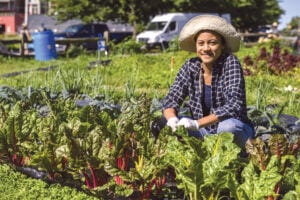
An interest in the intersection of community work and food systems led Marisa Thomas, a senior in environmental health and engineering, to spend last summer at Whitelock Farm in Baltimore’s Reservoir Hill community, planting, watering, and harvesting produce.
The experience was part of the university’s Community Impact Internships Program—one of the most popular internship programs available to the university’s undergraduate students. The program gives students the opportunity to gain real-world experience while being directly involved in the Baltimore City community. Since the program’s inception, interns have worked more 100,000 hours with more than 100 Baltimore City nonprofits, community groups, and government agencies.
Whitelock Farm, which is split between two lots on either side of Whitelock Street, began in 2010 as a community garden— transforming vacant lot space into a haven of fresh produce. Last summer, Whitelock sold its produce through a community-supported agriculture program, as well as a Saturday farm stand, where volunteers from partner organizations also occasionally held cooking demonstrations aimed at bringing the community together while transforming the produce into delicious meals.
Through her internship, Thomas not only gained experience with agriculture, but also enjoyed engaging with the farm community and surrounding neighborhood.
“It’s therapeutic to spend so much time in nature and working with plants that will eventually end up on someone’s table,” she says. “I’ve also learned that I really appreciate working with other people. I’ve been so fortunate to meet so many other folks in the Baltimore farming community, and it has helped me gain a better understanding of Baltimore because I didn’t realize how many urban farms were operating in the city.
“People really care about food access and the power and justice that comes from growing your own food, and I’ve really gotten to see the power of the Black community especially in securing more food security. We can’t do it all by ourselves so having the balance and community support can make a big difference.”




